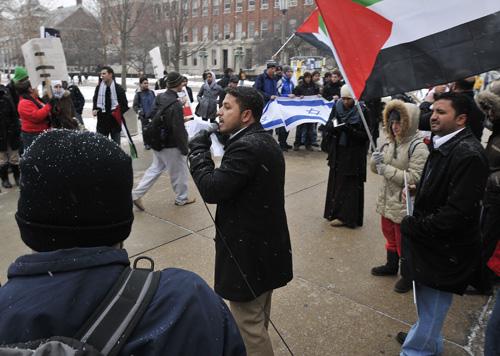Groups rally around Gaza conflict

Nasser Manasra leads a crowd of mostly pro-Palestinian supporters outside the Illini Union on Tuesday. A group of students showing their support for Israel also made an appearance on the Quad. Erica Magda
Jan 28, 2009
Last updated on May 13, 2016 at 07:12 p.m.
Students wielding both Palestinian and Israeli flags could be seen on the Quad on Tuesday afternoon as groups gathered to educate passersby of the Gaza conflict via megaphone and song.
“This is a right of everyone to present his or her point of view, so long as it’s peaceful and civilized,” said Ahmed Taha, research programmer at the National Center for Supercomputing Applications.
Sponsored primarily by the Muslim American Society, the event also drew protesters from Students for Justice in Palestine, the Council on American-Islamic Relations and a community group called Anti-War Anti-Racism Effort.
“There was another group of students supporting the Israeli side and both groups were present at the same time,” said Taha.
Get The Daily Illini in your inbox!
Taha said faculty and students do not feel the true tension of the conflict, but others believe it has local consequences.
“You have to look at a personal level where a lot of people have families in Gaza, a lot of people are from Palestine,” said Dana Al-Qadi, sophomore in Engineering and president of Students for Justice in Palestine.
Al-Qadi said this event was just one of many that her group has held to raise awareness about the situation Palestinians are facing.
“I guess because of the time, it’s more dire right now,” she said. “But this is a consistent thing and (so is) the demand for justice that we are maintaining.”
Some of the students present at the rally also attended a proctored question and answer session Tuesday night at the Siebel Center, where tensions grew stronger.
Lev Ratinov, graduate student, and a couple of his friends were escorted from the room for interrupting speakers.
“I wanted to make (the speaker) understand that he’s not fighting justice,” Ratinov said. “If he’s bringing peace but only presenting one side of the facts, he’s doing misservice to the Palestinians,” Ratinov said.
Kankakee Daily Journal writer Kristin Szremski, one of the speakers, brought to light the bias in America’s media by emphasizing the lack of credibility in relying on one source as a media conglomerate.
“The media that is supposed to be in a position of power is (subjecting) itself to censorship,” Szremski said. “It’s impossible to get fair coverage from one source who controls all that power.”





